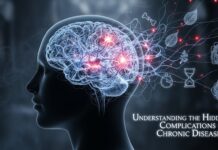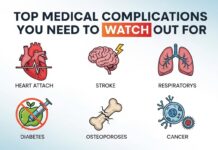Introduction
Sleep is more than rest. It conditions your body back to feeling normal, balances the hormones and fills the heart. When sleep continues to get interrupted over and over, the damage goes well beyond tiring. That is exactly what occurs with sleep apnea.
This disorder causes your breathing to be blocked out for seconds at a time. Your oxygen drops. Your brain jolts awake. Your heart beats faster. The cycle repeats all night. Many people dismiss snoring or morning grogginess. But untreated sleep apnea is silently driving your heart into serious damage.
This article explains how your patterns of sleep impact your heart. We’ll discuss the cascade of effects that accumulate over time and how leaving them unchecked will shorten your life. You’ll see by the end why even mild cases aren’t to be treated as minor.
Treatments may bring side effects. Be aware of neuropathy from prolonged chemotherapy and explore autoimmune pancreatitis treatment in children to support better care choices.
What Exactly is Sleep Apnea?
Sleep apnea is a chronic sleep disorder. It causes repeated pauses in your breathing as you sleep. These pauses may last 10 seconds and more. Some people experience them dozens of times an hour.
There are three main types:
- Obstructive Sleep Apnea (OSA): A sleep disorder, that occurs when the airflow is obstructed due to the relaxation of the muscles in your throat.
- Central Sleep Apnea (CSA): The brain does not give the muscles correct signals.
- Complex Sleep Apnea: A combination of the two
OSA is the most common. In all forms, there is decreased oxygen concentration and sleeping is disrupted. The body finds it difficult to make full sleep cycles.
This is where heart disease complications of untreated sleep apnea begin to form.
How Sleep Apnea Exhausts the Heart
Your heart relies on a constant supply of oxygen. During apnea, oxygen levels plummet. The brain sends signals for the body to wake up for a time to breathe. These surges are put as an acute guarding on the cardiovascular system.
Your blood vessels tighten. Your heart pumps harder. Blood pressure spikes. Over time these nightly stress events do not go away. They leave permanent marks on arteries, valves and heart muscle.
This almost constant strain results in:
- Hypertension
- Thickened heart walls
- Irregular heart rhythms
- Reduced pumping strength
The heart becomes weaker and less efficient.
Why It’s That Your Body Reacts The Way it Does
Your body perceives each apnea event as an emergency. Low oxygen is a threat to survival. Stress hormones like adrenalin flood your blood. Heart rate pumps to blast oxygen delivery.
The problem is frequency. What the rare within the rare does is happens every night, happens sometimes every few minutes. The body adapts by maintaining a constant state of stress mode. Blood pressure is raised permanently. The heart doesn’t ever get a full rest.
This cycle is the reason why so many patient with sleep apnea will also have high blood pressure and eventually heart disease.
The Domino Effect on other Organs
It is not just the heart that is the victim. Apnea involves an interruption in the function of several organs. Each one responds in different ways, but all require constant oxygen.
- Kidneys: These promote regulation of blood pressure. Chronic apnea adds insult to the risk of kidney damage that high blood pressure patients already have.
- Brain: Instability in blood flow has an effect on our memory and focus. For people with irregular rhythms, apnea leads to an increased risk for stroke risk atrial fibrillation.
- Eyes: Nightly oxygen drops can cause damage to the back of the eye, known as the retina, from the risk of vision loss due to diabetes that contains.
- Liver: The sleep apnea condition aggravates metabolic stress that feeds problems associated with liver cirrhosis complications.
This far-ranging impact makes apnea not only the problem of sleep, but a whole body disease maker.
Staying healthy starts with awareness. Learn about lifestyle changes to prevent Alzheimer’s disease, the first symptoms of Parkinson’s disease, and the early signs of thyroid cancer in women to catch problems early.

Physical Cues You Should Look Out for:
The syndrome of apnea is often easy to disregard. Many believe that snoring is not a harmful condition. But the pattern doesn’t lie and that tells another story.
Common signs include:
- Loud snoring most nights
- Holds in the breathing, noticed by others
- Inability to sleep with gasping or choking for air
- Being exhausted even after hours of sleep
- Morning headaches
- Moodiness and irritability
- Difficulty focusing
In this case, your heart is likely already stressed. Leaving them to ther own devices lets bigger troubles expand.
A Hidden Burden on Daily Life
Sleep apnea is not only damaging at night. These consequences will carry into your day. In fact, sleep deprivation suppresses your immune system. Fatigue involves a decline in productivity. Mood swings have an impact on relationship.
Their obvious physical suffering is only part of the load. Meanwhile, the price your heart is paying is only part on the surface. Every breath you skip is one more step to serious illness.
Why Early Action Matters
Rarely does apnea get better without treatment. Most cases get worse as you become older, gain weight or develop other health problems. Early recognition and treatment prevents permanent heart damage.
The sleep disorder can be confirmed by a simple sleep study. Treatment measures involve lifestyle adjustments, CPAP machines, or oral appliances. That doesn’t feel good, but they’re preventing silent heart attacks.
Apnea is never benign. By catching symptoms early, you can prevent heart disease complications from left untreated sleep apnea and protect your future health.
The Connection Between Sleep Apnea and High Blood Pressure
High blood pressure is one of the most common side effects of untreated sleep apnea. Each time you take a breath, your oxygen rises. The brain reacts by releasing stress chemicals. Your blood vessels constrict and your blood pressure climbs to an extreme.
This may seem minor at first. But not only that, imagine if it were happening hundreds of times every night. Your heart is under constant stress. Day by day, your blood pressure is not getting any better. It remains elevated throughout the day or increased.
Studies have shown that even more than half of sleep apnea patients also have hypertension. Day by day, this strain increases the more danger of the widespread kidney damage that the high blood pressure patients have already. The kidneys have an on and off effect to control fluids and hormones, making the cycle even worse.
Arrhythmias: The silent rhythm disturbances;
When a rapid decrease occurs in the body’s oxygen level, your heart rhythm asserts itself as unstable. Arrhythmias – irregular heart rhythm will develop and might not be noticed immediately.
The most worrying one is atrial fibrillation. This rhythm disorder causes the upper chambers of the heart to flutter, rather than pump smoothly. It decreases the efficiency of the blood flow and increases clot formation. This type of clotting can run off back to the brain, contributing to the risk of stroke – a nightmare for patients with atrial fibrillation.
Sleep apnea is a trigger all the time. Each night of broken breathing reveals more erratic circulatory stimulation for the heart. Eventually, these rhythm problems do happen on a permanent basis even while staying awake.
Heart Failure: When the Pump Stops Working
The other big complication is heart failure. This occurs when your heart muscle is too tired to pump blood effectively. Left untreated, sleep apnea sends the heart into overdrive. The left ventricle, the part of the heart that pumps oxygenated blood around the body, becomes stiff and thickened.
In the beginning, one may have only feeling of fatigue or shortness of breath. But as heart failure gets worse, fluid accumulates in your lungs, ankles, and abdomen. Signs at night are worse and it is a vicious cycle: your heart is stressed during apnea, and an already weak heart creates increased severity of any apnea attacks.
This condition is one of the most severe complications of heart disease due to untreated sleep apnea, creating many hospital admissions and an increased mortality rate.
Coronary Artery Disease: starving the heart
Your heart muscle requires a blood supply of its own. When the oxygen level is repeatedly low, inflammation accumulates within arteries. The fatty deposits are formed more rapidly and used to narrow the blood vessels. This process is known as atherosclerosis.
Over time, less blood will circulate to the heart, causing pain in the chest, which is also referred to as angina. In extreme cases, blockages can cause a heart attack. Sleep apnea does not directly cause blockages but accelerates the damage by keeping the blood pressure high and oxygen low.
Stroke and Brain Health
The brain is one of the most sensitive organs to the loss of oxygen. Even brief awakenings during sleep impact focus, memory and mood. Long-term apnea, however, puts someone at dramatically increased risk for stroke.
In individuals who already have arrhythmias, clots are more likely because of the oxygen’s instability. This is why stroke risk atrial fibrillation and apnea tend to occur together. Studies confirm that those patients with untreated apnea have a much higher chance of having an ischemic stroke.
Managing daily challenges matters too. Tips for coping with type 2 diabetes fatigue and a routine to reduce arthritis knee flare-ups can improve comfort. Also, untreated atrial fibrillation can raise stroke risk, making timely care vital.

Other Complications Besides the Heart
Sleep apnea is hardly ever found alone. It interacts with other conditions and the complications worsen.
- In diabetic people, the oxygen instability injures tiny blood vessels, accelerating diabetic vision loss.
- Chemotherapy: Oxygen stress aggravates neuropathy complications linked with chemotherapy: Patients under chemotherapy might experience numbness and tingling.
- Women with autoimmune diseases have emergency contemplations during pregnancy lupus, also associated with instability with stressing, the oxygen intensity of both mother and baby.
- People who have long-term alcohol-related disease may have worsening complications of cirrhosis in the liver if sleep apnea is neglected.
These links prove that apnea is not all about snoring. It is a whole-body disruptor.
A Real Case Example
Consider a 52-year-old man who is being diagnosed with severe obstructive sleep apnea. He refused to get treatment for several years because it was just snoring, he said. Over time, he developed uncontrollable high blood pressure. Later, he suffered from an atrial fibrillation. Finally he was admitted to hospital with congestive heart failure.
Doctors determined the root cause was his untreated apnea. After starting CPAP therapy, his blood pressure came under control and his episodes of arrhythmia also decreased. This case is very similar to what we always learn from medical research: if apnea is not being treated, the risks for heart disease are multiplied, but if it is treated the outcome changes.
The Role of Inflammation
One lesser known is inflammation. When the levels of oxygen become lowered, the body releases inflammatory chemicals. These molecules cause damage to the lining of the blood vessels. They also make blood “stickier” which increases the risk of: A blood clot forming.
Inflammation is a reason why patients with apnea will develop most conditions simultaneously. It is not only mechanical stress due to insufficient oxygen, but also chemical damage spreading through our body via the bloodstream.
Why Doctors Are Insistent on Treatment
Doctors emphasize apnea treatment not only to stop snoring but also to save the heart. Constant positive pressure breathing machines (CPAP machines) are most commonly used. They keep airways open and prevent oxygen drops and decrease stress signals at night.
Lifestyle changes are important as well. Solutions to help prevent apnea include weight reduction, minimal alcohol, regular exercise are all effective to decrease the severity of apnea. Slight improvements reduce the risks for long term.
Ignoring apnea is allowing yourself to suffer damage every night. Treating it means cutting the cycle, and allowing your heart a chance to recover its strength.
Why This Matters for You
You may feel fine now. Maybe you just snore or you feel a bit tired in the morning. But the stress on your heart is a silent cummulator. The problems are not existing today but will come out later.
Relevant signs that can be recognized early names the game. Early intervention against apnea helps prevent the long-term path towards hypertension, arrhythmia or heart failure. Safeguarding your sleep is safeguarding your future.
By acting now, you can prevent the spiral of complications of heart disease from untreated sleep apnea from getting too far.
Why Treatment Cannot Wait
Every night you go to bed in the throes of untreated sleep apnea, there is pressure on your heart. Oxygen level decreases, the blood pressure increases and the rhythm is affected. The damage is slow but steady. The earlier you intervene the more you save your cardiovascular health.
The doctors emphasize that it’s important not to ignore even mild apnea. The research evidence shows that treatment reduces the risks of hypertension, stroke, and heart failure. Regardless of the seemingly size of the symptoms if they are being ignored, this can lead to complications that persist into the long run.
Diagnostic Tools You Can Use
A sleep study is the ultimate test. An EEG monitors breathing, oxygen, brain activity and heart rhythm during sleep. There are two main types:
- Clinical Polysomnography: A full-length polysomnography test with sensors.
- Home sleep test: A more basic machine which you use in bed.
Both can authenticate how serious apnea is and have a part to play in directing treatment.
Harvard Health Publishing: Sleep apnea treatment options
There is no single cure. But there are several alternative treatments for reducing the episodes and guarding your heart.
CPAP Therapy
The most common form of treatment is CPAP (Continuous Positive Airway Pressure). Your reflex system keeps your airway open with a constant supply of air. Patients notice improvement in their energy level and reduction in blood pressure over a matter of weeks.
Oral Devices
Dentists can place little oral appliances. They move the jaw forward in order to keep open the airway. These are most effective on mild to moderate cases.
Surgery
In some instances, there is surgery done to remove the excess tissue or to rectify structural abnormalities. Uncommon but effective in situations where the anatomy prevents air flow.
Lifestyle Changes – Lifestyle changes that reduce risk
Device-free Lifestyle: Not having a device is important, as is the lifestyle that comes with it.
- Maintain a healthy weight.
- Avoid alcohol before bed.
- Quit smoking.
- Sleep about from your side rather than your back.
- Keep regular sleep hours.
Lifestyle changes lessen the severity of apnea and can also enhance the overall health of the heart.
Pros and cons of Sleep Apnea Treatment
Ten Ideas for Getting Better Sleep
- Make sure your bedroom is dark and cool.
- Never take a heavy meal at night.
- Nasal strips and humidifiers work well if you suffer from congestion.
- Go out and exercise, which includes light walking.
Small improvements add up. They make breath easy and cut down on apnea events.

Frequently Asked Questions: Sleep Apnea and Heart Disease
Q1: Is Sleep Apnea Really a Trigger For Heart Attack?
Yes. Untreated apnea leads to an increased blood pressure, fixes in arteries and an increased risk of arrhythmias. All these can be a trigger of heart attacks.
Q2: Does snoring always indicate apnea?
Not always. Snoring can be harmless. But if it’s accompanied by pauses in breathing, choking or daytime sleepiness, it’snektty likely apnea.
Q3: Can Sleep Apnea Be Cured With Weight Loss?
Dieting makes many patients less severe. But not all cases vanish. Even if people are thin on the outside, they can still be apneic because of their airway anatomy.
Q4: How much time should it take before my heart improves?
Many patients notice, within a few weeks of receiving CPAP, lower blood pressure and increased energy. Long-term toxicity is inversely related to length of treatment.
Q5: Can Sleep Apnea Occur In Children?
Yes. A common cause in children is obstruction of the upper airway by an enlarged adenoid or tonsil. If left untreated, it can have an impact on growth, learning and even heart health later in life.
Conclusion
It’s not just trouble sleeping – it’s also sleep apnea. It is a deadly disease that can wreck havoc on your heart without you ever knowing it. Left untreated, it increases your risk of hypertension, arrhythmias (fast heartbeats), heart failure and even stroke. It also aggravates other ailments such as diabetes, incongruencies in the body like receptors, kidney diseases and liver issues.
The good news is there is effective treatment. From lifestyle changes to CPAP machines, every step removes stress on the heart. By being informed and getting treatment as soon as possible after symptoms appear, you can avoid permanent damage.
Living today is preserving your tomorrow. Do not allow quiet nights to result in quiet destroying. If you address apnea now, you can avoid the complications of undiagnosed and left untreated sleep apnea, which may lead to heart disease.









